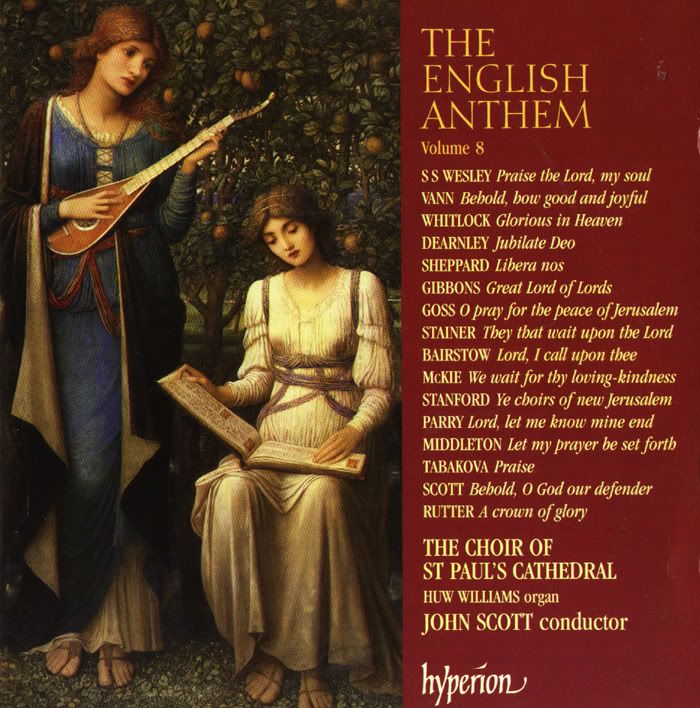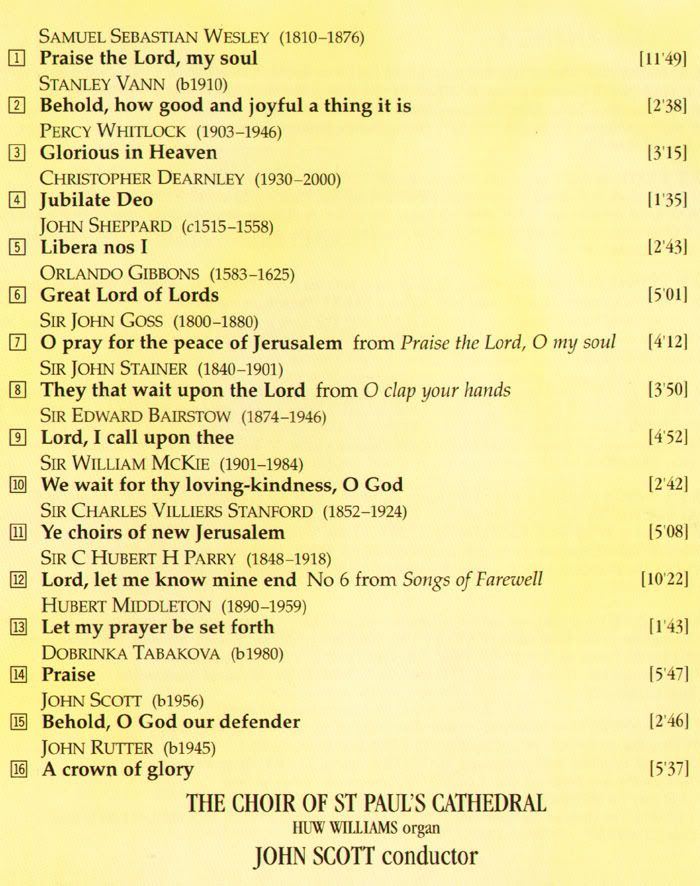 |
| NetLab · Rules · Torrent Tracker · Have a problem? · Eng/Rus |
 Help Help
 Search Search
 Members Members
 Gallery Gallery
 Calendar Calendar
|
| Welcome Guest ( Log In | Register | Validation ) | Resend Validation Email |
|
Posted: 21-01-2009, 22:58
(post 1, #876037)
|
||||||||||||||||||
|
Pro Member Group: Members Posts: 695 Warn:0% |
The English Anthem, Vol. 8 The Choir of St Paul's Cathedral Label: Hyperion, CDA 67483 Year: 2005 Performers: Huw Williams - organ The Choir of St Paul's Cathedral John Scott - conductor Fans of this series, and anyone who enjoys English church anthems--more specifically, cathedral anthems--will be pleased to see the arrival of this Volume 8, and will be equally happy to hear this collection of 16 works for choir and organ by such masters of the genre as S.S. Wesley (Praise the Lord, my soul), John Goss (O pray for the peace of Jerusalem), John Stainer (They that wait upon the Lord), Charles Stanford (Ye choirs of new Jerusalem), and Hubert Parry (Lord, let me know mine end). But there also are less-famous names such as Stanley Vann, Percy Whitlock, and Hubert Middleton, all of whom served at various British cathedrals during the 20th century and who contribute suitably grand, tuneful, and solidly traditional works. On the other hand, a certain "modern" sensibility infuses Christopher Dearnley's Jubilate Deo, St. Paul's director of music John Scott's Behold, O god our defender, and 25-year-old Dobrinka Tabarova's exquisitely atmospheric Praise, which perfectly exploits the big, resonant cathedral space. John Rutter's A crown of glory, commissioned for a performance at St. Paul's in March, 2004 (and which I don't recall seeing on any previous recording), closes the program in spacious, all-stops-out style. The same lively acoustic that lends important atmosphere to works such as the above-mentioned Tabarova piece and sends the final chord of Dearnley's Jubilate Deo shooting through the air, exploding like sonic fireworks also tends to obscure some of the more delicate contrapuntal textures as in John Sheppard's Libera nos I. But if you enjoy the unique sounds and echoes and reverberations that inevitably color the sound of cathedral choral music--and isn't that what this kind of recording is all about?--then you'll be right at home with Hyperion's sonic perspective, as clear and balanced as can be expected in this setting. And speaking of being "at home"--this choir has no superior in this repertoire, their performances marked by confident, enthusiastic ensemble work, fine solo singing, and first-rate organ accompaniments by Huw Williams. Also appreciated--and typical of most Hyperion projects--are the detailed and informative notes on each composer and composition. --David Vernier, ClassicsToday.com 'If this is Scott's swan song with the St Paul's Choir, it is a brilliant one. The choral tone and discipline are outstanding ... The Hyperion engineers demonstrate that they know how to record a choir in a highly reverberant setting. The tone is always clear but sumptuous, giving the listener a feel for the immense space involved yet never obscuring the musical textures. The audible reverberation at the pauses in Parry's Lord, let me know mine end is nothing short of breathtaking' (American Record Guide) 'The performances are excellent, as are William McVicker's booklet-notes, and the great echo's presence is felt as friend, not foe' (Gramophone) 'Each piece in this collection - those considered first-rate, those considered perhaps less than first-rate, and those perhaps scarcely considered at all - is given added quality through the pedigree of the performers and the performances; thus many find a stature which would surprise the cynic. If this CD enables some standard works to receive reference performances, and some lesser works to receive a fresh popularity, then it will have done more than most such collections. Warmly recommended' (Organist's Review) The arrival of this CD is a bit of a surprise, albeit a most welcome one. The previous seven volumes in this series were recorded between 1989 and 1998, with the last of those recordings actually appearing in the shops the following year, 1999. I’d collected the previous releases but had presumed the series had run its course. I can only presume that this final volume has appeared as a valedictory to John Scott who was Organist of St. Paul’s from 1990 until the summer of 2004, when he crossed the Atlantic to assume a similar post at St. Thomas’s Church, Fifth Avenue, New York. The programme contains an attractive selection of pieces which are, for the most part, typical staples of the English church music repertoire. In this, it is similar to the previous volumes. But, in common with the earlier issues, there are also some intriguing novelties. The other respect in which the disc is typical of the series is the excellence of the performances. The choir is on fine form and John Scott is clearly bequeathing to his successor, Malcolm Archer, a fine body of singers. In several of the pieces they are well supported by Huw Williams at the mighty St. Paul’s organ. Sometimes Williams is able to "let the merry organ go" but elsewhere he provides accompaniment of excellent discretion. John Scott’s direction is consistently sympathetic and he clearly is at home in all the different musical idioms in this programme. Just one or two of the items strike me as a little dull. Wesley’s anthem is one such. For much of its course the music is vigorous and forthright but it outstays its welcome. It’s a long wait to reach the simple eloquence with which Wesley sets the text of the closing pages, ‘Lead me, Lord’ (track 1, 9’23"). The Goss setting is also a bit tedious but the rest is splendid. Some of the pieces were new to me. Whitlock’s Glorious in Heaven, written in 1925, is scored for two five-part choirs. It’s confident and fluent and I liked it very much. John Scott is President of the Percy Whitlock Trust and his enthusiasm for Whitlock’s music is evident here. I also enjoyed making the acquaintance of the brief, bright and bouncy setting of the Jubilate Deo by Scott’s predecessor at St. Paul’s, Christopher Dearnley and also of the affecting miniature by Hubert Middleton. Two splendid pieces, one each by Stanford and by Parry, form the cornerstone of the collection which is fitting since these composer’s music is so deeply embedded in the repertoire of most Anglican cathedral choirs. Stanford’s anthem is strong and forthright, yet cultured at the same time. The same description applies to the performance that it receives here from Scott and his choir. Parry’s Songs of Farewell is one of the greatest masterpieces of unaccompanied choral music in the English repertoire. The last in the set, Lord, let me know mine end, is a superb and eloquent composition, skilfully and richly laid out for double choir. This is deeply felt music and John Scott successfully achieves a fine balance between giving the long phrases the time that they need to breathe while at the same time keeping the music on the move. The recital closes with three contrasting pieces, each of which was first performed by Scott and this choir at special services in St Paul’s in the last couple of years. The young Bulgarian composer, Dobrinka Tabakova’s anthem, Praise, was first heard in the cathedral in 2002 at one of the special services held there to mark the Golden Jubilee of Queen Elizabeth II. It was, apparently, her first venture into the genre but it strikes me as being highly successful. For the most part the music is more restrained than one might expect in view of the title of the piece. Miss Tabakova conjures some unusual and intriguing sonorities from the choir and the discreet organ accompaniment. The slow moving music is highly effective and makes good use of the vast acoustics of the cathedral. It sounds a demanding piece to sing but I hope this won’t prevent other choirs from taking it up for it merits wide exposure, I believe. So too does John Scott’s own Behold, O God our defender. This was composed, also in 2002, for the Queen’s Golden Jubilee Service, one of the centrepieces of the entire Jubilee celebration. Aptly, Scott chose to set a text which had been set by Herbert Howells, a composer he much admires, for the Queen’s coronation service back in 1952. It’s a reflective, tranquil setting which, as Scott openly acknowledges, is stylistically influenced by Howells. It’s a lovely piece. The concluding piece is also the most recent on the CD. John Rutter wrote A crown of glory for a celebratory service in St. Paul’s in 2004. It’s a fine anthem, grand and majestic and, as usual with Rutter, expertly written for the voices. It culminates in a noble, broad and very singable tune (track 16, 3’27"). Rutter’s work provides a splendid ending to the programme and very effectively brings down the curtain on John Scott’s distinguished tenure at St. Paul’s. The highly reverberant acoustic of St. Paul’s poses an undoubted challenge to recording engineers. However, the Hyperion team, both of whom have been involved with several previous releases in this series, have the measure of it. Solo voices, trebles in particular, can sound a little lost occasionally but in general the choir is faithfully reproduced, as is the organ. There are excellent notes by William McVicker, who provides informed and stimulating commentaries on the music, as he has throughout the series. Indeed, as always with Hyperion, the documentation is a model of its kind and includes the full texts, with English translations where appropriate. This is just one of innumerable CDs of great distinction that Hyperion has issued over the years. Many readers will know that the label is currently appealing a legal decision that went against it last year. If the appeal fails Hyperion faces a legal bill estimated to be more than Ј1 million. Such a massive liability would almost certainly mean the collapse of the label. Without venturing an opinion on the rights and wrongs of the case (though I have a very firm view on the subject) it would be a black day indeed for the record industry and for collectors if that were to happen and the invaluable and still-developing legacy of the late Ted Perry were to be lost to us. We must hope that Hyperion weathers this storm for releases of this kind are too precious to be lost to collectors. This present disc is a fitting conclusion to a highly distinguished series of CDs made for the label by John Scott during his tenure at St. Paul’s. I enjoyed it greatly and have no hesitation in recommending it to all lovers of the English choral tradition. John Quinn Tracklist: 01. Praise the Lord, my soul [11'49] Samuel Sebastian Wesley (1810-1876) 02. Behold, how good and joyful and thing it is [2'38] W Stanley Vann (b1910) 03. Glorious in Heaven [3'15] Percy Whitlock (1903-1946) 04. Jubilate Deo [1'35] Christopher Dearnley (1930-2000) 05. Libera nos, salva nos I [2'43] John Sheppard (c1515-1558) 06. Great Lord of Lords [5'01] Orlando Gibbons (1583-1625) 07. Praise the Lord, O my soul Sir John Goss (1800-1880) 08. O clap your hands Sir John Stainer (1840-1901) 09. Lord, I call upon thee [4'52] Sir Edward Cuthbert Bairstow (1874-1946) 10. We wait for thy loving-kindness, O God [2'42] Sir William McKie (1901-1984) 11. Ye choirs of New Jerusalem, Op 123 [5'08] Sir Charles Villiers Stanford (1852-1924) 12. Songs of Farewell Sir Hubert Parry (1848-1918) 13. Let my prayer be set forth [1'43] Hubert Stanley Middleton (1890-1959) 14. Praise [5'47] Dobrinka Tabakova (b1980) 15. Behold, O God our defender [2'46] John Scott (b1956) 16. A crown of glory [5'37] John Rutter (b1945)   LOG
This post has been edited by kgkk on 21-01-2009, 23:00 |
||||||||||||||||||
|
|||||||||||||||||||


Powered by Invision Power Board v1.3.1 Final.

